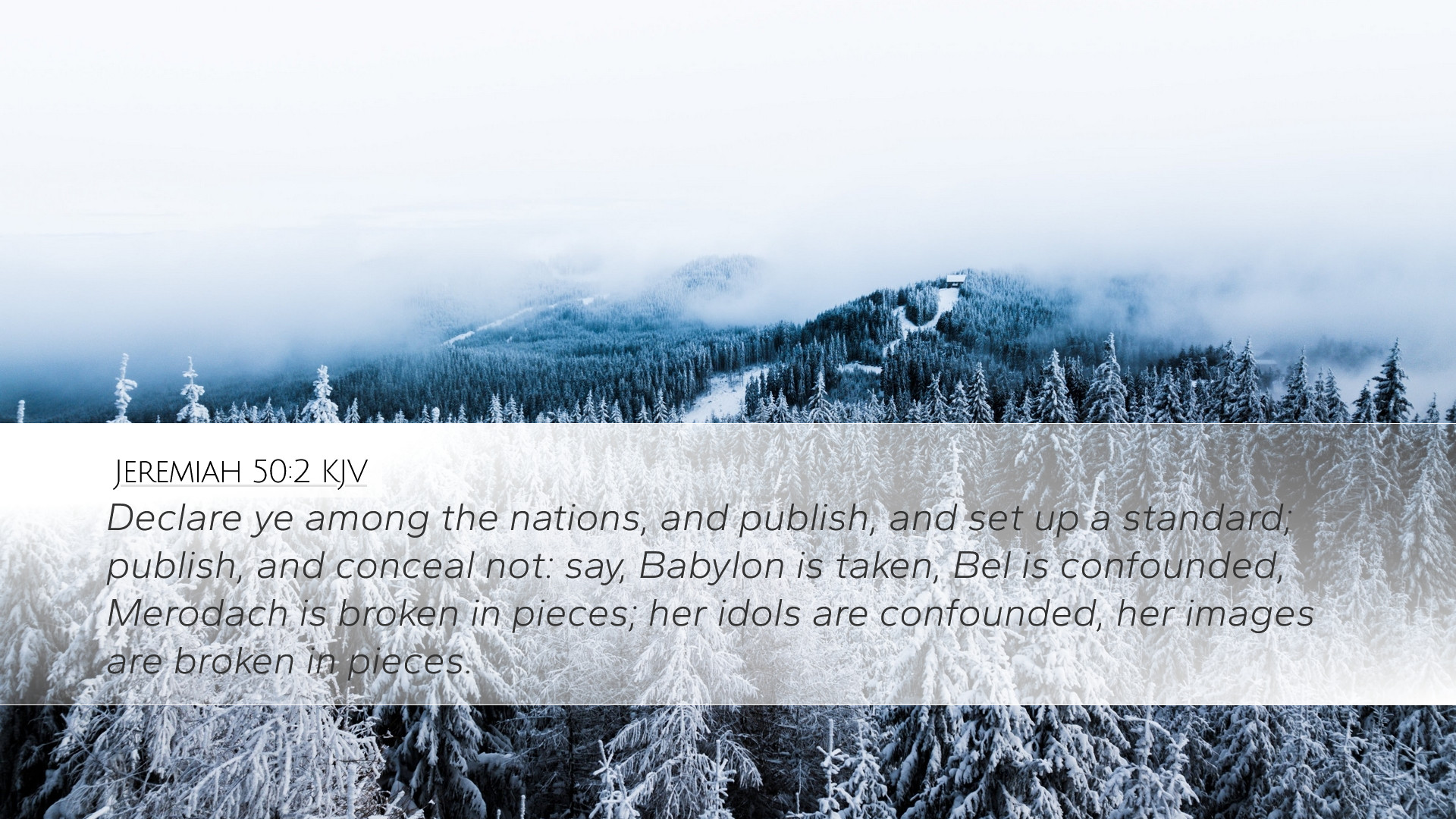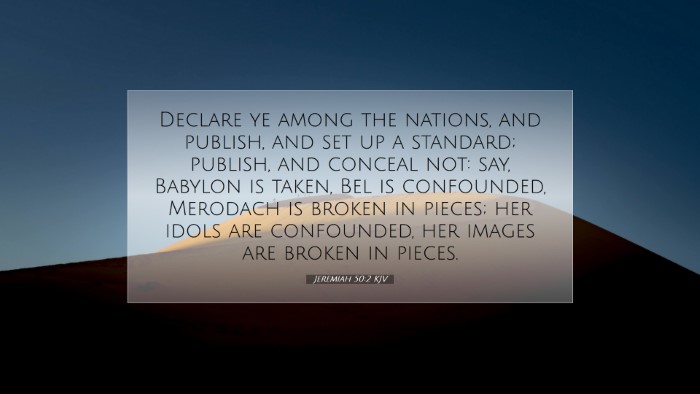Commentary on Jeremiah 50:2
Jeremiah 50:2 states: "Declare ye among the nations, and publish, and set up a standard; publish, and conceal not: say, Babylon is taken, Bel is confounded, Merodach is broken in pieces; her idols are confounded, her images are broken in pieces."
Overview and Context
Jeremiah 50 is part of a larger section of prophecy concerning Babylon, following a theme of divine judgment against the nations that have oppressed Israel. In this chapter, we find a declaration of the fall of Babylon, which serves both as a warning and a message of hope for God's people. The verse emphasizes the necessity of public proclamation regarding Babylon's downfall, symbolizing the collapse of its idols and pagan deities.
Insights from Public Domain Commentaries
Matthew Henry's Commentary
Matthew Henry emphasizes the significance of the proclamation mentioned in this verse. He notes that the call to declare the fall of Babylon is not only a message of defeat for Babylon but also serves to encourage Israel. It highlights God's sovereignty, indicating that He is in control over the nations, including those that have wronged His people. He states:
"The fall of Babylon, the mother of harlots, must be proclaimed in the ears of the people, so that they may no longer look upon her as an object of envy or admiration."
Henry also discusses the symbolism of the names mentioned—Bel and Merodach—indicating that the fall of these deities reflects God's power over false gods. The idols that once represented strength and security are now shattered, demonstrating that they cannot stand against the Almighty.
Albert Barnes' Notes on the Bible
Albert Barnes focuses on the urgent nature of the proclamation. He asserts that the repeated call to "publish" reflects the importance of spreading the news widely:
"The announcement that Babylon is taken should not be kept a secret; it must be heralded from mountain to valley, for it signals a new dawn for the oppressed."
Barnes elaborates on the significance of the phrase "Bel is confounded". Bel, a major deity in Babylonian worship, represents all that Babylon prided itself upon, indicating that the downfall of Babylon also means the defeat of its cultural and religious pride. Barnes stresses:
- The need for boldness in declaring God’s judgment.
- The assurance that God will uphold His word and bring justice.
Adam Clarke's Commentary
Adam Clarke takes a more detailed look at the implications of the text. He notes the directive to not only declare but also to set up a standard. This standard symbolizes hope and victory for the people of God:
"Setting up a standard is a metaphor for rallying God’s people to rejoice in His triumph over evil. It signifies a call to readiness and bravery."
Clarke also expresses the deep spiritual resonance of the idols being confounded and broken. He underscores how this act illustrates God's superiority over the very beliefs that once seemed unassailable to the people of Babylon:
- This is a reminder of the futility of idolatry.
- It serves to encourage believers in their own trials against worldly powers.
Theological Implications
This verse provides profound insights into the nature of God as the sovereign ruler over all creation. The proclamation is a reminder of the ultimate victory of God over evil, showcasing His power to raise and bring down kingdoms. For theologians and pastors, this verse underscores several key theological themes:
- The sovereignty of God: God’s declaration of the end of Babylon reflects His authority over the nations.
- The call to witness: Believers are tasked with proclaiming God’s truth and power in their own times.
- Strength in weakness: The Israelites are reassured that their God is greater than their captors, offering hope amidst despair.
Conclusion
Jeremiah 50:2 serves as a powerful witness to God's faithfulness in delivering His people from oppression. The combined insights from Matthew Henry, Albert Barnes, and Adam Clarke enrich our understanding of this text, illuminating its call for proclamation and the assurance of God's sovereignty. In a world still struggling against various forms of 'Babylon', this message resonates strongly, encouraging pastors, students, and scholars to boldly declare the truth and hope found in God’s ultimate victory.


